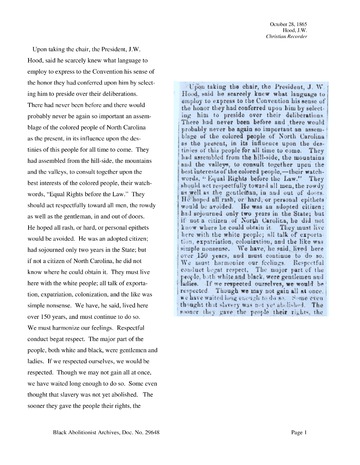(page1).jpg.jpg)
Title: Colored American - July 15, 1837
Speaker or author: editor
Newspaper or publication: Colored American (1837 - 1842)
The writer reminds his readers of the importance of the right of suffrage for all Americans. He urges all African Americans to petition the government regarding suffrage legislation and voting rights.
Description of file(s): one scanned, two columned, newspaper page
(page1).jpg.jpg)
Title: Colored American - October 19, 1839
Speaker or author: editor
Newspaper or publication: Colored American (1837 - 1842)
The writer makes a distinction between "political action" and "moral action" regarding the issues of slavery and emancipation. He tells his readers that some abolitionists are acting only as it serves their political purposes, not as a moral obligation to God. He urges his readers to continue going to the polls, but to cast their votes for what is religiously right, not what is best for the political party.
Description of file(s): two scanned newspaper pages (three columns)
(page1).jpg.jpg)
Title: Colored American - October 2, 1841
Speaker or author: editor
Newspaper or publication: Colored American (1837 - 1842)
The writer gives an overview of the annual meeting of the New York Anti-Slavery Society held in Utica. The meeting was well received and a great success. Issues addressed were independent political action and "Church action."
Description of file(s): one scanned newspaper column

Speaker or author: Hood, J. W. (James Walker), 1831-1918
Newspaper or publication: Christian Recorder (1852 - 1856)
The speaker stressed that the ideas of colonization and "exportation" were nonsense. He emphasized that African Americans had four major requests: 1) the allowance to testify in court, 2) the right to serve on a jury, 3) the right to act as counsel for a black defendant, 4) the right to vote.
Description of file(s): PDF 2 page, 404 word document (text and images)
spe.pdf.jpg)
Speaker or author: Langston, John Mercer, 1829-1897.
Newspaper or publication: Liberator
The speaker emphasized that the law in South Carolina that authorized "the sale of any Negro or Mulatto found in the state more than 12 days" was being used to sell white people more than fugitive slaves. He noted that any man could be called a mulatto and sold under this law. He urged reform and called for the white public to get involved for their own sake.
Description of file(s): PDF 5 page, 1,378 word document (text and images)



